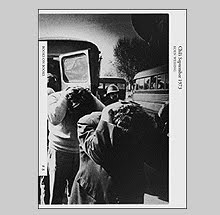Dear Knights and Dark Horses by Thomas Roma

"You can't go back home to your family, back home to your childhood, ... back home to a young man's dreams of glory and of fame ... back home to places in the country, back home to the old forms and systems of things which once seemed everlasting but which are changing all the time—back home to the escapes of Time and Memory." - Thomas Wolfe
In 2005 I agreed to make some photographs for a non-profit organization concerned with returning veterans who were facing homlessness. For various reasons they had fallen through most societal safety nets after being denied their military benefits and were then living in shelters or worse, on the streets of New York. I was put in touch with a man living on Staten Island who's disability benefits had been revoked. What he did initially get in benefits from the government was now being asked to be paid back. Broke and unemployed, he and his young family were facing eviction from their home.
We talked and smoked cigarettes on his front porch while I made a handful of pictures. He was 29 and had spent two tours of duty in combat in Iraq. He spoke openly and even with excitement about his friends who were still serving as if he had just returned from an amazing and successful fishing trip. He asked if I would like to see some of his photographs.
On his laptop he previewed for me hundreds of images; his friends posing with futuristic weaponry and displaying a bravado that belied any apprehension. Interspersed were dozens of images of bodies of Iraqis strewn along the roadsides and in ditches. I say the word "bodies" but they looked more like rumpled bedsheets of skin with a limb or bone protruding indicating it was once a human being. He revealed no emotion but his pace slowed to half time, lingering on the photos of the bodies longer than his friends. I masked my inability to stomach his slideshow by staring at his hand working the computer mouse. I asked him if he looked at these pictures often and he said "all the time." Almost sounding hurt he added that his wife wouldn't look at them with him. He also mentioned he wished he could go back and serve a third tour or longer. He had found something inside himself there that he seemed to long for now that he was safe at home. I think of that man as I look through Thomas Roma's book Dear Knights and Dark Horses published this year by Powerhouse.
How photographers shape their personal protests vary greatly. Some book a flight and search out access to war to photograph directly and other do so in a more nuanced way. Roma is not a photojournalist. His book is a quieter, less immediately sensational protest, but none the less powerful. For those unaware, Roma has been photographing in Brooklyn for thirty years and is a prolific bookmaker. He is not a world traveller and rarely leaves home to make photographs. What connects him to home, his values, and desires, is woven into the texture of his pictures.
In January of 2004 Roma photographed Army National Guardsmen of the 258th Field Artillery Regiment as they were about to be deployed to Iraq from Jamaica, Queens in New York City. He pairs these portraits with a collection of pictures of coin-operated pony rides that can be found outside of many convenience markets and drug stores in his home city of Brooklyn. Divided in the book - the pony rides first, then the soldier portraits afterward - the pictures metaphorically comment on bravery, past youth and the moment felt when required to leave home. It avoids glamorizing war and bravery, instead concentrating on the individuals without depicting them with pity. These are the same men we sit next to on the subway, stand in line behind at the bank, or work beside.
If we associate youth with going to war, one will be surprised to see that a majority of these portraits are of men who appear to be older than expected. Perhaps some signed up for the National Guard with the intention of taking advantage of college money or a paycheck, playing the odds that history wouldn't thrust them into combat. Decked out in fatigues and loaded down with equipment, there is a weighty sluggishness present in the postures which I find unsettling. They are momentarily frozen like their dime-store counterparts waiting to be set into action. In front of Roma's camera, they look off towards an uncertain future while background details sometimes foreshadow their vulnerability. In one image, a ghostly disembodied leg marches through Roma's slow exposure.
The size, the sing-song title, and the simplicity of presentation of Dear Knights and Dark Horses, share qualities that might bring to mind it is book meant for children. One could argue it is. It is a parable of how experiences change our lives. Most of us will never go to war, our lives will change and our perspectives shift through less life threatening means. War however seems to change people like a blunt instrument. Like the man I met in 2005, they come back changed forever.











